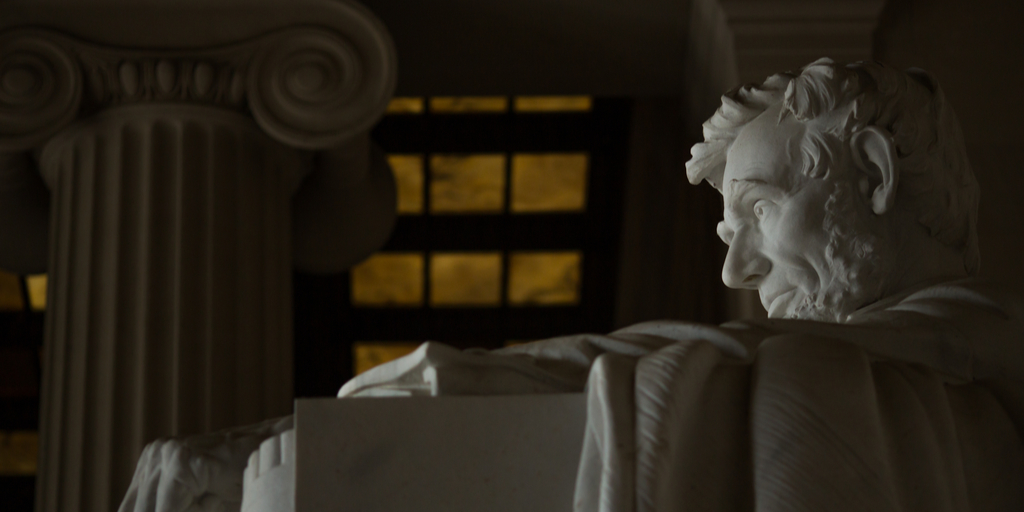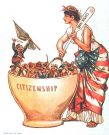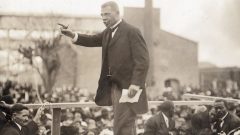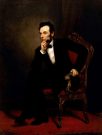Lincoln and Liberal Democracy
When an author heaps another monograph atop a towering Everest of scholarly literature, the groans of thousands of graduate students beg for mercy. The author should have a compelling reason for increasing the burden of their literature reviews and for asking us to read another work on a well-worn topic. Author Jon D. Schaff presents a respectable reason for writing a new book on Abraham Lincoln. In Abraham Lincoln’s Statesmanship and the Limits of Liberal Democracy, he is concerned about the health of liberal democracy and wishes to present lessons drawn from his study of Lincoln’s statesmanship. His thesis is that “for a free people to remain free, they must live within limits.”
Democracy, he means to say, is not an unqualified good. He takes issue with vox populi vox dei, or the belief that whatever the people pronounce should be received as the voice of God. This premise underwrote the doctrine of popular sovereignty advanced by Stephen Douglas. If the majority chooses to enslave a minority, then it is just and permissible, subject only to the requirement that the decision to enslave or not was the authentic act and deed of the people. In his chapter on natural rights, Schaff addresses this faulty premise of Douglas’s argument and Lincoln’s well-known counterattack.
The need to remind Americans in our own times that democracy can gravely err in deciding questions of justice is strong in proportion to our confidence that democracy is always right and good. We can see democratic leaders today seeking effective cover for specious enterprises under the shield of vox populi vox dei. Among the more egregious cases is the defense of expropriation of white-owned lands without compensation, by President Cyril Ramaphosa of South Africa. Expropriation will be done in accordance with the constitution of South Africa, he assured the world, as if larceny on a massive scale is just and permissible when accomplished through the normal forms of majority government. You can hear the strains of Douglas in that defense. Yes, democracies can destroy themselves by unjustly aggrieving the innocent and through other means.
How shall a democratic people limit themselves and thereby preserve their health and prevent their self-destruction? Schaff turns to Lincoln’s statesmanship for answers.
The book is divided into two parts. Part 1 discusses Lincoln’s political thought and includes chapters on his prudence and moderation, his insistence on following the law and on respecting natural rights. Part 2 aims to prove that Lincoln was a Whiggish president, deferential to Congress, and only grasped for extraordinary powers as the extraordinary circumstance of civil war demanded.
The division of the book and its contents raise questions about Schaff’s purpose. Demonstrations of Lincoln’s prudence tell us more about the limits of democratic statesmanship than about the limits that a democratic people should observe. Schaff writes, “when an opinion, even an ill-founded one, is universally held, prudent statesmen cannot discount it.” Indeed, Lincoln recognizes and attempts to reshape ill-founded opinion. But what does that teach us about the proper political conduct of the people?
In the second part, Schaff goes to great lengths in successfully proving that Lincoln restrained himself and deferred to Congress on domestic legislation touching the Pacific railroad, the division of the public lands into homesteads, and the establishment of land-grant colleges. But what do these instructive chapters have to do with the requirement that democratic people live within limits? The second part of the book has more to do with Lincoln’s self-restraint as president and his constitutional interpretation of proper presidential conduct. Here, Schaff refutes the thesis of Charles and Mary Beard and of James McPherson that Lincoln revolutionized the presidency and ushered us into the age of presidency-centered, unlimited government.
Schaff might have better tied this second part of his book to his general thesis by arguing that the people ought not to demand monarchic conduct from their president. He might have researched the question of popular expectations today, perhaps beginning with immigration activists’ public appeals to President Barack Obama to override the Constitution and unilaterally legalize the residency of foreigners present in America today. He might have compared these public appeals to the Hebrews, who asked for a king in substitution for self-government, in 1st Samuel. Then, he could reframe the example of Lincoln’s conduct on domestic legislation to demonstrate a fit contrast to our modern expectations.
In short, Schaff’s project lacks discipline. The book does not proceed in the direction that his thesis points. Much is said that could be cut or condensed, and much is not said that should have been included. The argument of his book could be more consistent and more unified.
However, the material is commendable and is competent scholarship. If for no other reason, the book warrants a friendly reception because it extends the reach of classical political science and its focus on political regimes and statesmanship, for the benefit of academic research and teaching alike. Schaff covers a significant amount of scholarship from history and political science in a book that barely passes the 200-page mark.
In chapter 1 on Lincoln’s prudence and moderation and chapter 2, Lincoln’s defense of natural rights, Schaff owes much of his interpretation to Harry Jaffa, Allen Guelzo, and Harry Clor. Purists might prefer the original authors but Schaff adds a few good twists. He compares modern demagoguery to the example set by Stephen Douglas. Our political leaders today habitually inflame prejudice for political advantage, as Douglas did. The harder but better path, following Lincoln, is to publicly acknowledge opinions we do not hold and then to reform and guide public opinion. First befriend, then convert.
Schaff also confronts purported critics of liberal rights; Burke through the eyes of Yuval Levin (at least Schaff’s interpretation of Levin’s Burke), Robert Kraynak, and Alasdair MacIntyre. We can infer from his response, which might have been better and more directly stated, that the abuse of liberty does not oppugn the natural right to liberty but rather, the abusers of liberty. One problem with his response is that he takes, as given, Burke’s rejection of natural right. But Burke’s reliance on tradition might be conceived as a better means of protecting natural right than wiping away traces of the inherited political order and re-establishing political society de novo, on the sole basis of fallible human reason. The mind of man is not as adept at creation as the divine mind. Lincoln recognized that Burkean lesson, too.
Schaff moves to Lincoln’s ideas on political economy in chapter 3, and here he shows some originality. He convincingly argues that although Lincoln rated wage labor higher than slavery, he did not believe that the condition of wage labor was the desired final state of labor. Wage labor, in Lincoln’s view, was an intermediate condition, like apprenticeship, whose best end is free labor, or the proprietor who works for himself. Although Schaff’s argument that Lincoln believed in the superiority of self-employment to wage employment seems correct, I do not recognize evidence in the historical record that Lincoln or other Republicans used the term “free labor” in precisely this sense. For them, free labor meant the negation of slave labor only. Free labor was not an “ideology” as Eric Foner argued, not an expression of new economic ideas. The term was coined in response to the rising advocates of slave labor, to merely express the archetype of a free citizen in the economic dimension whose condition in a free political society is superior to that of an unfree person in a society where slave labor prevails.
Then follows an interesting discussion of distributionism, or the Catholic idea dated to the papal encyclical Rerum Novarum by Leo XIII in 1891, that labor ought to broadly share in property ownership. Shorn of its religious roots, Lincoln’s idea of the property-owning laborer working for himself shares something in common with the property-owning laborer in Catholic thought. Schaff’s goal is to show that Lincoln believed, as the Church later taught, that economies ought to be regulated towards a higher good, not towards the maximization of material prosperity. Without that regulation, the unbridled pursuit of happiness leads to unhappiness, the evil of economic dependency on either the state or large economic combinations. That dependency vitiates both the idea of human dignity promoted by the Church, and the idea of independence and self-government, promoted by Lincoln. The dubious premise here is that conditions of greater liberty lead to the concentration of wealth, greater wealth inequality and dependence, rather than the greater diffusion of wealth and economic independence. Did Lincoln share this premise? Schaff is not convincing that he did.
The remaining chapters 4-6 of Part 2 work together. These chapters address “Lincoln’s use of presidential power in regard to matters not connected to the war.” Chapter 4 extensively quotes James McPherson on the foundation of the future economy that was established during Lincoln’s presidency. Finally, Schaff ends his quotation of McPherson with the following line: “‘…Abraham Lincoln was one of the principal architects of this capitalist revolution.'” The Beards, too, held Lincoln to be “a revolutionary statesman” in this sense, not as the great emancipator, but as a captain of the bourgeois revolution in America. Lincoln is depicted as an energetic president like our twentieth century presidents, bending presidential power towards legislation, to midwife the new system.
Not so, is Schaff’s response. He painstakingly reviews McPherson’s own sources to prove that McPherson’s conclusion was unwarranted. Lincoln was relatively passive during the congressional debates on the Pacific railroad, the Homestead Act, and the Land-Grant College Act, and these were the momentous shifts in domestic policy that laid the foundation for industrial development. With regard to the important Legal Tender Act, his lieutenant Secretary of the Treasury Salmon Chase was heavily involved with Congress, but Chase worked behind the scenes, in similar fashion as Secretary of the Treasury Alexander Hamilton during the Washington administration.
Lincoln never went over the head of Congress. He never solicited public support for these bills. He never attempted to use popularity as a cudgel to force his agenda through Congress. Lincoln confined his influence to written suggestions in his messages to Congress. He restrained himself and let Congress take the lead on these important domestic policy measures, unlike modern presidents. He did not bring a legislative agenda to office, which is expected of our presidential candidates today.
Lincoln’s exercise of war powers was a different matter, Schaff concedes. But in my view, Schaff goes too far in accepting critics’ accounts that place Lincoln’s exercise of power as commander-in-chief beyond the limits of the Constitution.
Schaff seems to be familiar with the work of Mark Neely, who best dispenses with this criticism. Article I, section 9 of the Constitution is not ambiguous, as Schaff claims, about the power to suspend writs of habeas corpus “in Cases of Rebellion.” It is ambiguous about who may suspend the writs. Lincoln preferred that Congress do the deed, but they were out of session and the nation was in the middle of rebellion, so Lincoln did it. When Congress returned, he asked them to decide the question by law, which they did in the affirmative, to remove any doubt that habeas corpus was properly suspended.
As commander-in-chief in a time of rebellion, Lincoln could have ordered that Representative Clement Vallandigham of Ohio be shot for aiding and abetting the enemy. Instead, he dropped off the traitor at the feet of Jefferson Davis. This act was unusually merciful given that Vallandigham was assisting the murderers of the sons of his constituents back in Ohio. No, Lincoln was not the bloodthirsty tyrant that neo-Confederates revel in saying, and I would not like Schaff to accept any of that drivel. Lincoln was as careful as he could be to follow the Constitution and exercised extraordinary powers when he had to, to save the Constitution from an enemy that drew as close as a few dozen miles from the White House.
But Schaff’s target in Part 2 is not the neo-Confederates. It is the Progressives. In disproving the claim that Lincoln exercised unconstitutional or extraconstitutional powers to stimulate industrial development, Part 2 complements Jason Jividen’s Claiming Lincoln, which also denies the progressives’ seizure of Lincoln’s mantle. Slavery, American republicanism, the Constitution, and the Union itself were in the forefront of Lincoln’s mind from the passage of the Kansas-Nebraska Act in 1854 until he was assassinated in 1865.
Schaff adequately proves that a new economic order was not a priority to Lincoln in the years leading to his presidency, although Lincoln did subscribe to the Whig idea of internal improvements. Lincoln brought with him Whiggish ideas about the exercise of presidential powers, in contrast to the muscular exercise of powers by President Andrew Jackson, the Whig opponent. Schaff’s review of Lincoln’s conduct as president when important domestic legislation was enacted in Congress proves that Lincoln was faithful to the principles of “an old Whig” follower of Henry Clay.
Contrast that to Woodrow Wilson and Franklin Delano Roosevelt. Long before Wilson ever was Governor of New Jersey, he criticized constitutional government, especially Congress, and argued for placing the president at the front of policy-making. On the campaign trail, Roosevelt promised a new economic order, superintended by the federal government. Lincoln was attempting to save the old order from internal threats. He beat back slavery, the enemy of American republicanism and restored constitutional government. The progressive presidents attempted to change the old order into a new one.
It is hard to make out how Schaff’s discussion of these matters is an argument about the limits that a people must observe in a democracy, but there is ample material in this book that can be refashioned to explore that question.



